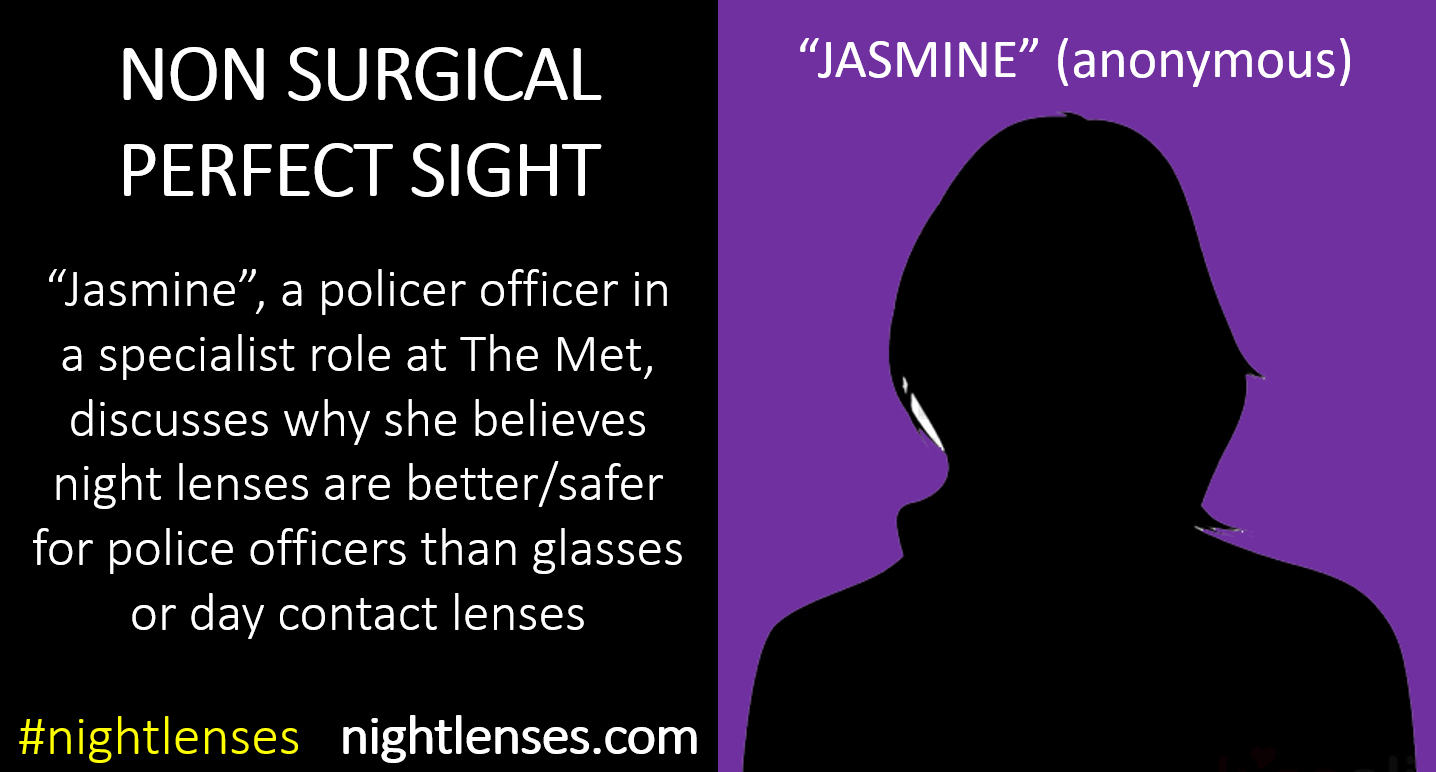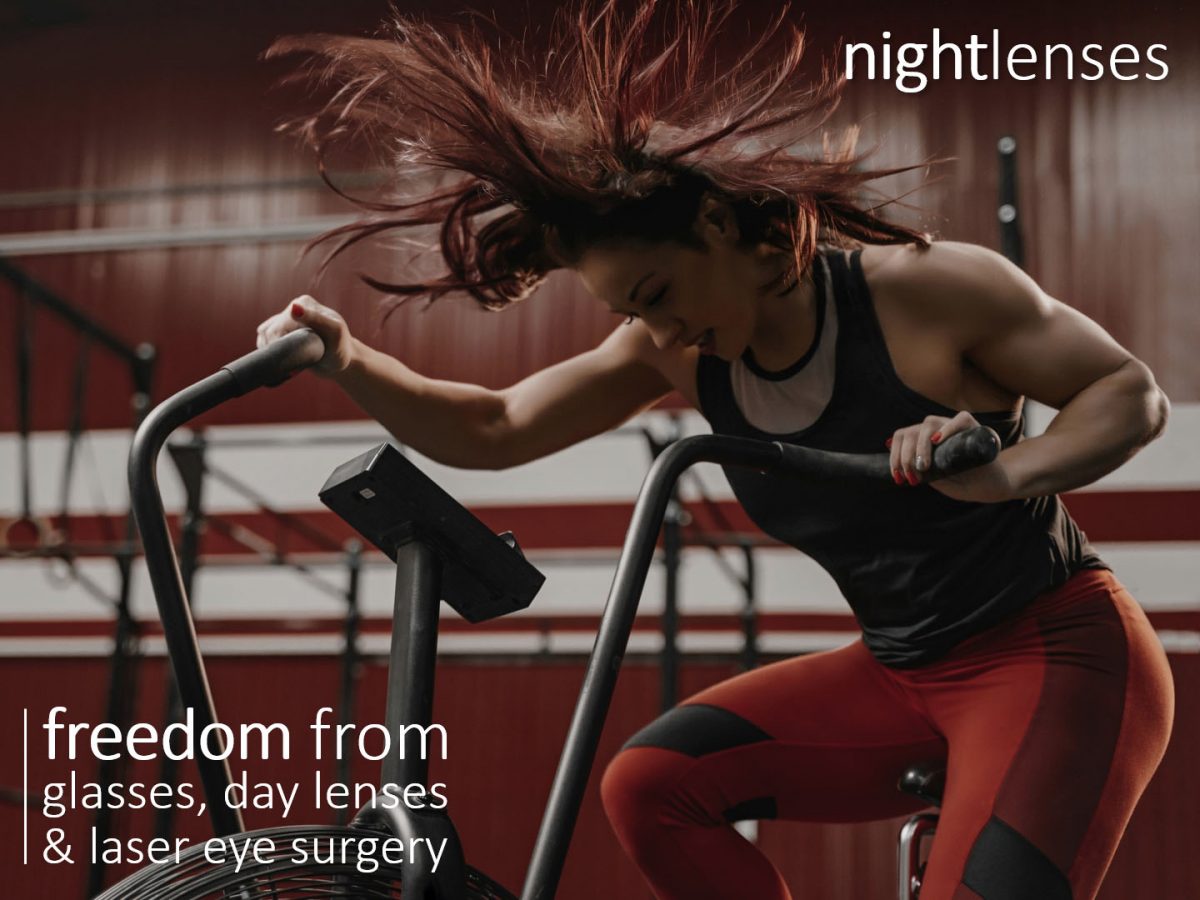Part 1: Had a yarn with Officer “John” (keeping it hush-hush), aged 47, clocking 13 years on the front line with TSG in Northern Ireland. Recently fitted with night lenses, and let me tell ya, they’ve turned his life around. Reckons he should’ve snagged ’em sooner, both for the job and the home front. His take? Policing is smoother and safer with night lenses compared to the day ones. Check out the chat with him – full transcript for your eyes right HERE.
Part 2: Kept the convo rolling after John’s piece, had a chinwag with night lens wearer “Jasmine” (also not her real name), a cop in a specialist role in The Met. Full transcript of her chat is below, or you can catch it on YouTube HERE.

Spot on. Got the glasses gig as a teenager, but wasn’t a fan, so by 16, I shifted to contact lenses. Joined The Met at 18, and by 21, laser eye surgery was on the cards. Enjoyed about 12 to 13 years of top-notch vision. When my sight started slipping, faced a choice – go back to contacts or specs? That’s when night lenses popped up on my radar. Honestly, had no clue what they were at first, felt a bit wary, but the more I dug into it, the more it seemed like a solid option. The simplicity sold me – slap on some lenses before bed, snooze, and wake up with corrected vision. Wrap your head around it or not, it worked like a charm. By morning, my vision was spot-on, like with glasses or contacts, but without having anything in my eyes. Awesome to skip both and still have perfect vision all day long.
With your shift work in the role, any concerns about rockin’ night lenses?
Nah, piece of cake. If I’m on the night shift, hitting the hay during the day, I just pop in my night lenses. First thing upon waking, out they come, and boom – perfect vision through the night. Regardless of the shift, as long as I wear ’em during my snooze – a minimum of 4 hours for the difference – that’s me sorted for a whole day’s vision. Usually, I’ll stretch it to a day and a half before realizing it’s time to pop ’em back in. The game-changer is that every day I can head to work without the fear of my contacts bailing on me. Especially during those extended shifts when, as most cops know, you think you’re wrapping up, then boom – last-minute call, or you’re on an extra-long stint – before you know it, 20, 24 hours deep. Tired, eyes dry, blinking non-stop – nice not having to stress about any of that or reach for eye drops. Stoked I stumbled upon night lenses.
In our chat with another officer, we called him ‘’John’ from TSG in Belfast, who kicked off with night lenses in his late 40s. Active operational role, just like you. He echoed the sentiment – in the midst of a long shift, stuck in a van with no escape, his lenses would get itchy and dry. Looking back, he agreed that having perfect sight with nothing in his eyes would’ve been a game-changer in those situations. Let’s shift to your operational role – the early days and then the move into the specialist role. Reflecting on the operational side, where CS gas might come into play – if you had night lenses back then instead of day lenses, would things have been smoother?
Absolutely, mate. I’d recommend anyone eyeing day contacts to make the switch to night lenses. If we had to bust out CS spray or PAVA nowadays, no need to stress about the aftermath. Some folks might be fine, but for me, it hit as hard as the person I was dealing with. So, it’s sweet knowing you’ve got nothing in your eyes that could add to the irritation. Given the choice, I’d pick night lenses over day contacts, especially knowing PAVA’s impact on regular lenses.

Absolutely! I’m into things like HIIT and circuit training, high-impact stuff. The beauty for me is knowing I can dive into that without stressing about losing my contact lenses, or worse, them hitting the floor. So, it’s perfect for high-impact workouts. Another plus is when I hit the pool for a swim with my little one. I can dip my head underwater without worrying about my vision or lenses bailing on me. Clock watching is a breeze – everything’s crystal clear, exactly as expected, without the need for lenses or glasses. No steaming up during runs, no worrying about mishaps. I’ve had night lenses for about seven years now – wouldn’t even consider going back to day lenses. If I had known about this before laser eye surgery, I’d have jumped straight into night lenses. Many folks assume laser is a once-and-done deal, lasting 20 to 30 years. Realizing I had to explore alternatives less than 15 years later, knowing what I know now, I’d have gone with night lenses first.
It’s great to chat with someone who’s experienced both laser and night lenses. Many folks think laser surgery is a permanent fix, but it isn’t! There are risks, floaters, and other concerns that terrify people. Your take, having been through both, is that for those considering laser, night lenses are a good way to ease into a glasses-free life, test the waters – and laser could be an option later on?
Exactly! Laser is always an option down the line. Another thing I appreciate is that my prescription has remained steady over the years – consistent for the past seven years. Night lenses have maintained my eye stability. With lasik, I was on a slow decline. So, if you’re not keen on surgery or see laser as a big commitment, give night lenses a shot as a solid alternative. I wish I’d known about them earlier.
Prior to this interview, we touched on the term ‘myopia,’ and I found it amusing to break the news to you – you’ve got myopia! [Jasmine laughs] For those tuning in, unfamiliar with myopia – often referred to as ‘short sight,’ it’s a medical condition linked to eye disease, detached retinas, and the like. First off, do you think colleagues with short sight need to know this term and understand what it is? Secondly, as a parent, if you have myopia (short sight) or your parents do, chances are your child might. Is this something worth exploring and understanding for your child?
Absolutely! Honestly, at the big-name places on the high street, it’s ‘short sight’ and ‘long sight.’ Nobody brings up myopia. I didn’t know about it until now. Short sight is brushed off as not too serious, fixable with lenses or glasses. When you realize it worsens over time and can lead to eye disease, you realize you were a bit naive or didn’t think it through. Now that I’m more aware, I’m more cautious. It’s better to stay on top of this than be too relaxed. There might be an underlying health issue that needs addressing. With night lenses, I’ve been going to my independent optometrist annually, getting extra check-ups. You might not get that with some big high street chains – I know I didn’t get the same check-ups there, but I do here. It’s nice to compare and say, “No, this is consistent for me,” or “There’s something here that needs further attention.”
On that note, let’s give a shoutout to Jaimin Patel, your optometrist at Vision Eyecare, who I know is a fantastic independent optometrist, spending the time needed. Jasmine, we’re around the same age, and basic info is crucial to understanding our eye options and what happens as we age. This is why I’d encourage all short-sighted folks to ask for a MyopiaChat next time they see their optician.
Last but not least, a two-part question: First, would you recommend night lenses? [I think we know the answer!]. Second, echoing my question to ‘John’ from TSG, is it safer for police officers, if they can be fitted with night lenses (less than -6D), to use night lenses rather than day lenses for their roles?
I’d absolutely recommend night lenses. [No surprises there!] And here’s why, having spent 13 years in operational or frontline policing. In confrontational situations, you’re not pondering, “If I get punched, is my contact lens going to fly out?” If you’re using PAVA or another option, knowing your reaction – how badly it’ll affect you? During extended tour duties, if you’re wearing daily lenses, I know they’ve come a long way, but after 18–20 hours, you start feeling the effects – dry eyes, thinking, “I need eye drops.” But with night lenses, it’s genuinely nice not stressing about dry or itchy eyes, or constant blinking to keep them lubricated. For these reasons, I’d say definitely give night lenses a go. Jaimin, my optometrist, was top-notch. It takes time for him to get it right for each person [Note: all night lenses are custom-made to your eyes, not mass-produced]. But once he nailed it for me, I’m glad I did it – years of perfect vision, going about my business without worrying about glasses. I can do anything – sauna, steam room – without stressing about glasses coming off or contact lenses getting infected. It doesn’t impact my personal, social, or work life. It’s the right balance for me.
Absolutely! I mentioned before the interview that my reason for being here, doing this, is that my son’s life changed completely with night lenses. He’s 17, a surfer! Without stabilizing his myopia with night lenses, he might have hit -6 or -7 and progressed from there. With no glasses or contacts, he wouldn’t have seen the waves. Now he surfs with confidence, so I agree that night lenses are truly fantastic!
Thank you so much for your time and sharing your story. We really appreciate it.
Further info
